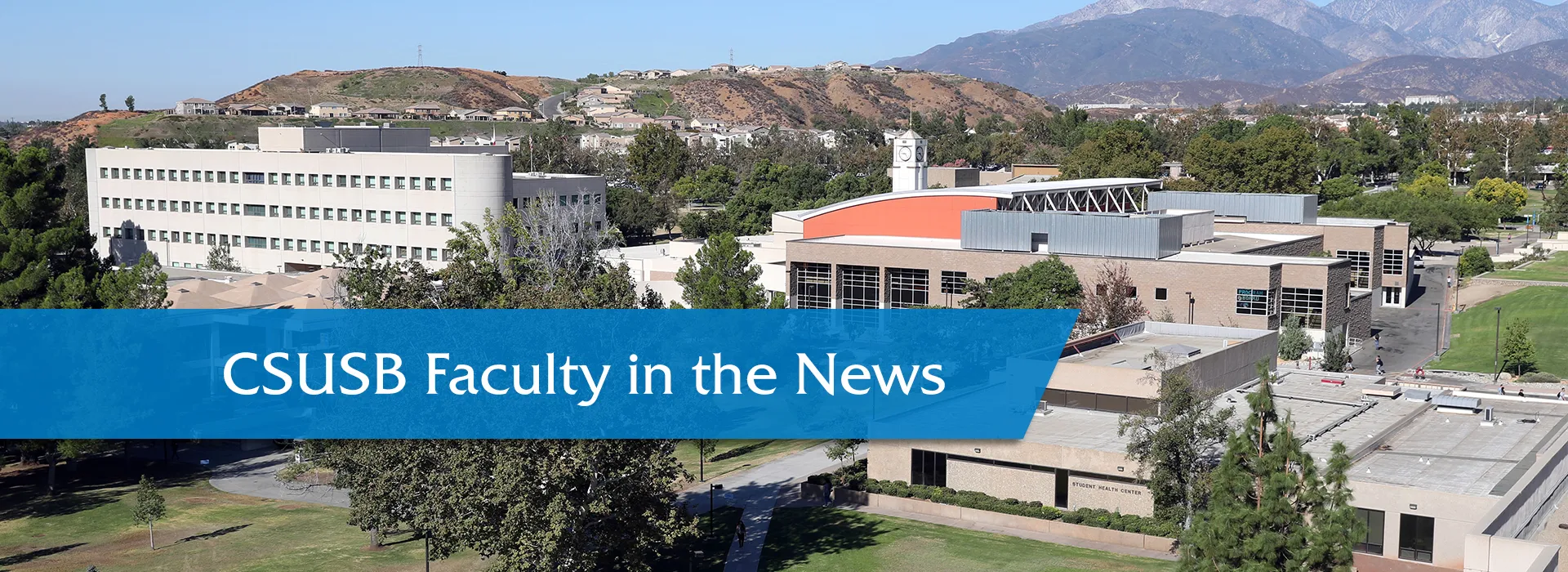NOTE: Faculty, if you are interviewed and quoted by news media, or if your work has been cited, and you have an online link to the article or video, please let us know. Contact us at news@csusb.edu.
Hate crimes increasing, but few turn out to be hoaxesVOANews.comFeb. 23, 2019 The number of hate crimes, or crimes against a protected minority, has increased over the last several years in the United States. Advocates fear the alleged false reporting of a hate crime by an American actor may cause people to doubt real victims and prevent some victims from going to the police. VOA's Carolyn Presutti takes a look at the impact of a hate crime hoax in a country facing deep divisions, and interviewed Kevin Grishiam, assistant director for research for the Center for the Study of Hate and Extremism at California State University, San Bernardino. Watch the full online video report at “Hate crimes increasing, but few turn out to be hoaxes.”
Discussion of hate crimes has ‘from fair-minded professional critiques to downright conspiracy theories,” CSUSB professor saysThe Washington PostFeb. 23, 2019 The nascent culture war over hate crime obfuscates what researchers call the empirical truth of hate crimes: They are rising in America. And exceptionally few are hoaxes. “What’s been disturbing in the sciences is that we’ve gone from fair-minded professional critiques to downright conspiracy theories,” said Brian Levin, director of the Center for the Study of Hate and Extremism at California State University, San Bernardino. “The American public has a right to know [hate crime facts] but there is an orchestrated campaign by political pundits not to only point out limitations in the data — which is appropriate — but to obscure the real information that is out there.” Read the complete article at “‘An orchestrated attack against truth’: How the clash over hate crimes has become one more 'culture war.’”
Hate crime hoaxes are rare, but can be ‘devastating,’ says CSUSB professorThe New York TimesFeb. 22, 2019 Hoaxes are not tracked formally, but the Center for the Study of Hate and Extremism at California State University, San Bernardino, said that of an estimated 21,000 hate crime cases between 2016 and 2018, fewer than 50 reports were found to be false. The center believes that less than 1 percent of all reported hate crimes are false. But such false reports can play an outsize role in undermining the credibility of real bias victims and anti-hate efforts. In the aftermath of Mr. Smollett’s arrest, one lawmaker has even promised to draft a bill increasing the penalty for filing false hate crime reports. “Devastating is how I would describe this Smollett story, especially during this legislative season when some states are trying to pass hate crime reform bills,” said Brian Levin, a national hate crime expert and the California center’s director. “This has the potential to eclipse the real facts about hate crimes.” Read the complete article at “Hate crime hoaxes are rare, but can be ‘devastating.’”
The Jussie Smollett case's far-reaching consequences: 'The worst possible thing at the worst possible time,' CSUSB professor saysNBC NewsFeb. 23, 2019 When Chicago police charged Jussie Smollett — a black and gay actor, who reported he had been attacked by two white men with a rope, shouting homophobic and racist slurs — with filing a false police report this week, the news landed like a lighted match in a well-stocked tinderbox. Smollett has denied wrongdoing. … Smollett’s alleged fabrication “is the worst possible thing at the worst possible time,” said Brian Levin, who directs the Center for the Study of Hate and Extremism at California State University, San Bernardino.Read the complete article at “The Jussie Smollett case's far-reaching consequences: 'The worst possible thing at the worst possible time.'”
CSUSB hate crime analysis shows few incidents are hoaxes, and actual hate crimes are under reportedLos Angeles TimesFeb. 24, 2019 The dramatic unraveling of the story of a vicious attack on actor Jussie Smollett has spread deep concern among hate-crime victims that growing racist and anti-gay violence now may be more likely to go unreported and unpunished, the newspaper reported. Brian Levin, director of the Center for the Study of Hate and Extremism at Cal State San Bernardino, said he has counted just 48 cases nationally of false hate crime reports over the last three years. That’s 0.3 percent of all hate crimes reported. Many cities are not “meaningfully participating” in reporting hate crime data, he said, adding that “we have a far greater problem with under-reporting” than false reporting. Of the more than 16,000 law enforcement agencies in the country, at least 14,000 did not report data to the FBI last year, or told the bureau that there were no hate crimes in their jurisdictions.
CSUSB professor discusses ramifications of alleged hate crime hoaxesKABC Radio (Los Angeles)Feb. 21, 2019 Brian Levin, who directs the Center for the Study of Hate and Extremism at California State University, San Bernardino, was a guest on the Peter Tilden show to discuss the fallout from the alleged hate crime hoax by actor Jussie Smollett. Among the topics covered was whether additional penalties should be added to falsely reporting a hate crime, and other possible effects such hoaxes have on the reporting of such incidents. Listen to the online audio interview at “Peter Tilden 2/21/19 6 pm.”
These news clips and others may be found at In the Headlines” at inside.csusb.edu.
